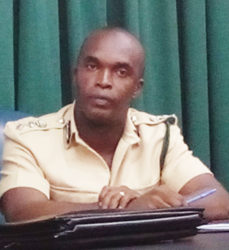Although cell phone jammers were installed at the Camp Street Prison prior to the July 9 fire and jailbreak, their use was discontinued owing to some issues, acting Prisons Director Gladwin Samuels revealed yesterday.
“There is a reason why those jammers that were initially installed …that we had to take steps to desist from the use of it, which I cannot disclose here, but jammers were installed at Camp Street Prison prior to the fire but there were setbacks that resulted in them not being in use,” he told a press conference yesterday, while responding to questions about the prisoners’ continued possession of mobile phones and their frequent use of social media.
During the raids at the various prisons across the country, authorities have found dozens of cell phones and other prohibited items.

One of the recommendations of last year’s Commission of Inquiry (CoI) into the Camp Street prison fire was the “need for installation of an effective jamming system for all cell phones.” It was recommended that it could be installed at high risk security blocks, if not the entire prison compound.
Subsequent to this recommendation being made, a large number of phones were found during prison raids and observers have repeatedly questioned how the prisoners managed to get them into the prison without detection.
Recently, prisoners being housed at the Lusignan pasture have updated their Facebook pages and posted pictures of their surroundings. Some have also live streamed the chasing of animals and the slaughtering of a cow.
Samuels told reporters that inmates would secure cell phones by several means but he did not reveal any.
Last year’s CoI had been told that items such as phone were smuggled into prison by “pouching,” where inmates would conceal contraband in their anus.
Samuels yesterday only said that some offenders are “real men” and others were “differently classified.” Those in the latter category, he added, would insert phones in various places. “But I can safely say to you that we would have found a ‘real man’ who secured one of those phones because after he was sanitised and later re-sanitised, he was found with the phone and… while cavity searches can be done, it must be done when you have reasonable cause. You cannot just go searching a prisoner’s cavity because it is gonna create serious conditions in the prison,” he further said.
Samuels added that the public can speculate about what should and what could be done but “the reality of it is, in order for us to carry our certain operations, it will require the use of force. Should we do so, it will provoke another situation, which I am quite sure this nation is not ready for. And further, should we do that, then we will be chastised as it relates to why we are operating so recklessly.”
He acknowledged that he is disturbed by the fact that prisoners are in possession of cellphones and are going live on Facebook. “I am a no-nonsense guy but [Prison Warder Odinga] Wickham is already dead. Going and place prison officers and other members of the Joint Services to confront these guys, who are extremely angry, will create another situation,” he said, before adding that having spoken to his officers about two hours before the press conference, “a lot of the frustration demonstrated and being expressed by these guys [the prisoners] is beyond the control of the prison department.”
Minister of Public Security Khemraj Ramjattan told reporters that two sanitation exercises conducted at the pasture unearthed 22 cell phones on the first occasion and 27 on the second occasion, in addition to “a whole set of weapons.”
“These are smart guys,” he said, while observing that the situation is a dangerous one and therefore authorities do not want to risk “people [security personnel] going in there and then when you go make a search it is hardly likely because they put it in the ground somewhere.”
Ramjattan said knowing the current limitations, the prison authorities with the help of the security forces are trying to get all “these objects that are alien to prisoners from the prisoners.”
Asked if there was a failure on the part of security given that prisoners are in possession of phones, he said, “That is not necessarily the case, and understand the predicament we were in that night [July 9]… it’s a lot of people we had to deal with and they could hide as they did in the first round of sanitization.” He questioned how thorough officers could be in the circumstances. “I am here not trying to say we didn’t do a good job of it. The perfect job we will never know… for all you know they might still be one or two phones still in there,” he stressed.





